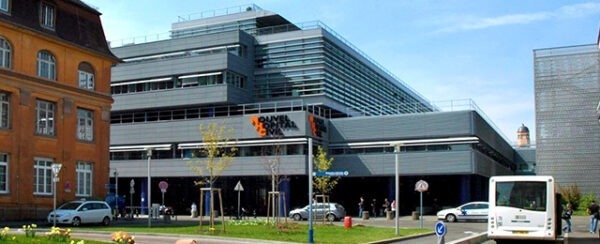University Hospital of Strasbourg | Centre of Excellence

Professor Afshin Gangi, MD, PhD, is a renowned interventional radiologist and an esteemed authority in oncological interventional radiology. He is the Professor of Radiology and Chairman of Radiology and Nuclear Medicine at the University Hospital of Strasbourg, France, where he leads the Interventional Radiology department. Prof. Gangi also serves as a professor at King’s College London.
Born on December 7, 1962, Prof. Gangi is a multilingual professional fluent in English, French, German, and Persian. His distinguished career began with his medical studies in Reims, France, and continued with residencies and specialized training in Strasbourg and Luxembourg. He holds a PhD in laser physics and has been a full professor of radiology since 2000. Throughout his career, he has contributed significantly to research and education, including over 200 scientific papers, more than 500 lectures, and authorship of 40 book chapters.
Prof. Gangi’s dedication and expertise have earned him numerous accolades, including multiple “Certificates of Merit” and “Cum Laude” awards, as well as the prestigious Andreas Gruentzig lecture at CIRSE. He is an honorary fellow of several professional societies, including the British Society of Interventional Radiology and the German Society of Interventional Radiology.
Within CIRSE (Cardiovascular and Interventional Radiological Society of Europe), he has held various leadership roles, culminating in his presidency from 2019 to 2022.
Throughout his career, Prof. Gangi has been committed to advancing the field of radiology through both clinical innovation and professional leadership, making him a highly respected figure in global interventional oncology.
Under Prof. Gangi’s leadership, the University Hospital of Strasbourg achieved the prestigious designation as the first IASIOS Centre of Excellence. This recognition reflects the hospital’s adherence to the highest standards in interventional oncology, having met all 52 core and extended criteria set forth by the CIRSE Standards of Quality Assurance in Interventional Oncology. This accomplishment underscores Prof. Gangi’s commitment to quality, safety, and innovation in oncological care, further solidifying his and his institution’s status as global leaders in interventional radiology.
Get to know Prof. Gangi a little bit better!
What are your hobbies and interests outside of your professional work in medicine?
I enjoy motorcycle riding, hiking, and paragliding for adventure. I also love watching movies, listening to music, exploring different wines, and cooking as creative outlets.
Can you share a pivotal experience from your education or career that has significantly shaped your journey in Interventional Oncology?
During my residency in the lung cancer department, seeing the severe pain cancer patients endured was a turning point. It motivated me to focus on finding minimally invasive ways to improve their quality of life.
What motivated you to choose a career in Interventional Oncology over other medical specialties?
The combination of diagnostic imaging and intervention intrigued me, as it allowed for both diagnosing and directly treating patients. Interventional oncology is a fast-growing field with exciting opportunities for research and development, which made it an ideal choice.
What inspired you to pursue IASIOS accreditation for your practice or institution?
We needed a high standard of quality to ensure our procedures were safe and reproducible. IASIOS accreditation provided a framework for achieving this, helping us maintain the highest level of care for our patients.
How does IASIOS accreditation benefit both patients and Interventional Oncologists?
IASIOS has helped us identify and address gaps in our practice. It has enabled us to standardize our interventions, improving patient safety, and showing both our institution and patients our commitment to quality care.
What key improvements has IASIOS accreditation brought to your Interventional Oncology services?
IASIOS has led to improvements in safety protocols, greater standardization of procedures, and reproducibility of outcomes, all of which have enhanced the quality of care we deliver.
How do you envision the future of Interventional Oncology, and what role do you see it playing in the broader field of cancer care?
I believe interventional oncology will become a key player in cancer care, evolving into an essential pillar of treatment.
What advice would you give to the next generation of Interventional Oncologists?
Focus on being excellent clinicians first. Master diagnostic radiology, and then work towards becoming skilled operators to provide the best care for your patients.
University Hospital of Strasbourg | Strasbourg, France

